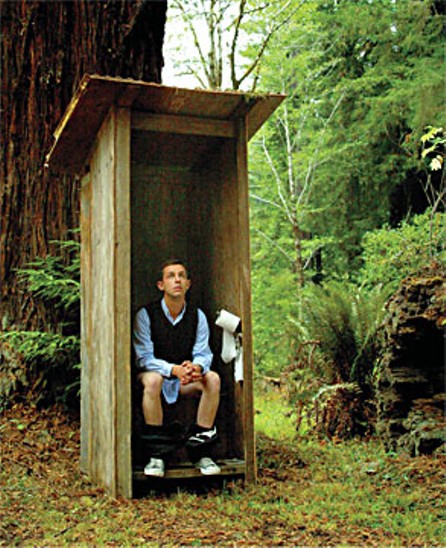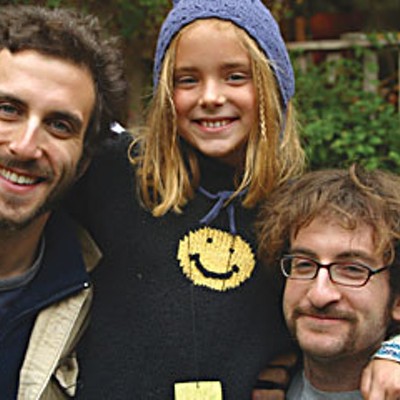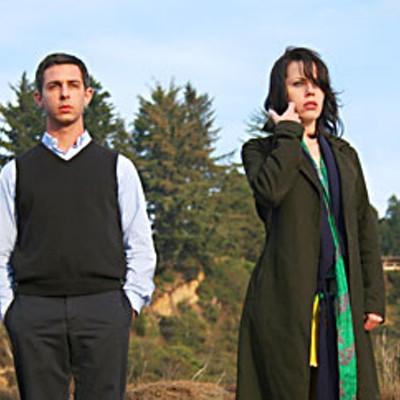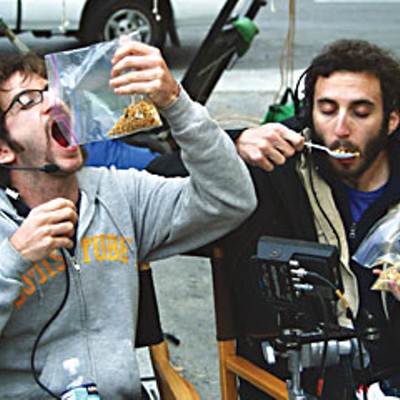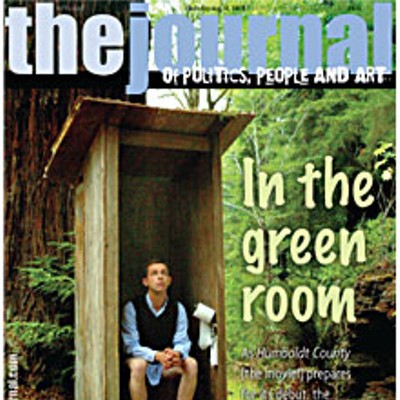In The Green Room
As Humboldt County (the movie!) prepares for its debut, the directors revisit their inspiration
By Robyn Hillman-Harrigan[
{
"name": "Top Stories Video Pair",
"insertPoint": "7",
"component": "17087298",
"parentWrapperClass": "fdn-ads-inline-content-block",
"requiredCountToDisplay": "1"
}
]
For me, the story of Humboldt County the movie began back in June at the Provincetown International Film Festival. Some friends introduced me to Danny Jacobs and Darren Grodsky, and quickly they became part of my new film-fest hang-out crew. Somewhere between gala receptions and beer-doused Quentin Tarantino ogling sessions, I found out that my new friends were the directors of Humboldt County.
"No way!" I exploded. "You made that film. I haven't seen it yet but I am going to be in Humboldt this summer! That is so cool." We chatted about the region and I promised to see the film later that day and catch up with them for an interview sometime in the future.
Danny and Darren made for great company and I found their close relationship with each other to be especially charming. "Big D" and "little d" is not only how they sign off on their e-mails, but is also what their comedy troupe should be called when they decide to form one. Danny is short, energetic and warm, while Darren is tall with a low voice, and uses his somewhat stoic demeanor to deliver well-timed deadpan lines. The duo, who have been friends since they were small children, moved from Missouri to Los Angeles together after college, determined to pursue their dream of becoming filmmakers.
Once they arrived in L.A. -- without contacts or any major prospects -- they cleverly infiltrated the film scene by forming the "Danny and Darren Mentor Project." This program in action consisted of them calling and e-mailing filmmakers who they respected, and requesting the opportunity to meet with them and gain advice. D and d's goal was to make their first feature film before turning 30. Surprisingly, the filmmakers they targeted responded generously.
These new connections came in handy when the budding directors shopped their vision around the houses of Hollywood's wealthy movie enthusiasts. They were able to get the entire film privately funded with just a PowerPoint presentation, a committed producer (Jason Weiss) and their signature unbending drive.
Humboldt County tracks the experience of Peter, an L.A. native who finds himself in Southern Humboldt after sleeping through a very long car ride. He awakens in a remote, off-the-grid house, complete with an outdoor composting toilet. After the first day, Bogart (Fairuza Balk) the one-night-stand woman who brought him there, surreptitiously departs. This leaves Peter in the hands of his new hosts, three generations of the pot-growing Truman family: the grandparents, Jack (Brad Dourif) and Rosie (Frances Conroy); their son, Max (Chris Messina); and their granddaughter, Charity (Madison Davenport). They explain that Bogart comes and goes unexpectedly. Despite an initial panic, Peter is soon drawn into the SoHum lifestyle and forgets to leave. Instead, he gets dirtier, slowly relaxes, forms friendships with the family and helps Max tend to his marijuana crops.
A couple of weeks ago, I made good on my promise to interview Danny and Darren. I got them on a conference call to L.A. and further south in Arcadia. Our presence in three different locations did not detract from the feeling that we were back in the same room, joking, laughing and talking about films. This time, one film in particular: Humboldt County.
Robyn Hillman-Harrigan: Hey, guys! For those who have not seen it yet, can you briefly summarize the film?
Darren Grodsky: Sure! Humboldt County is a coming-of-age drama about Peter (Jeremy Strong), a medical student in L.A. who has a kind of quarter-life crisis and realizes that he doesn't want to be a doctor anymore. He meets a girl named Bogart, who is from Humboldt County, which is a real place about 200 miles north of San Francisco. It also happens to be nicknamed "the pot-growing capital of North America." He ends up going back with her to her home and has a coming-of-age experience among pot growers in the middle of the woods.
Danny Jacobs: You're in Humboldt County right now, aren't you, Robyn?
RHH: Yes I am, I'm speaking to you live from Humboldt County, from Arcata.
DG: Right. I knew that, but I forgot while I was halfway through my synopsis. Did that sound rote to anyone? Because I felt like I was on autopilot. I wasn't emotionally connected to it at all.
dJ: I zoned out completely, until the part where you were explaining what Humboldt County is to someone who lives in Humboldt County!
DG: At least you were listening closely enough to recognize my folly.
RHH: Describe Peter's first reaction to being deposited into the scene of the Truman house in Humboldt.
DG: The attitude that Peter has when he arrives is one that many people have before they come to Humboldt, when they have heard that there are a lot of resident pot growers. We wanted to explore this notion of a guy who kind of judges the Trumans at first and then ends up really finding a lot of life in them once he eventually gets to know them.
When I was growing up my parents sent me to visit my aunt and uncle for many summers and I really fell in love with my whole Humboldt experience. I was in southern Humboldt, completely living off the grid in a rural pot-growing environment. This experience is only one small part of Humboldt, but it was what I knew. I took Danny up there several years ago and we were actually working on a different script at the time. After he met everyone, we were both so affected by being there that we decided to start writing about Humboldt.
dJ: After Darren brought me there, I quickly fell in love with Humboldt. We got a little motel room in SoHum and we pounded out the first draft. Then during the next couple of years as we continued to write, we kept going back there for research and inspiration sessions.
RHH: I have heard a lot of people say that it is really hard to write and create art in Los Angeles. It is not uncommon to go to other places to seek inspiration. Humboldt is not a bad choice -- definitely stimulating and appealing.
dJ: L.A. is not the real world. It's a fantasyland, and it is easy to get disconnected from human beings here.
DG: We find in L.A. it is really easy to get caught up in what I call "the meeting culture." You just sit down and have a bunch of meetings and you feel like you accomplished something, but really you haven't. You have just talked about accomplishing something. L.A. is a non-creative, not inspiring place. That has been our experience thus far. While Humboldt, whether it is the natural beauty, the isolation or the interestingness of the people, it was definitely a great source of inspiration.
While we were in Humboldt, just the sheer messiness of trying to define the place and understand people was really appealing, and made it seem like the right story to tell. We have long been influenced by ’70s Hollywood filmmaking. That is our favorite era of cinema and we wanted our first film to follow the inspiration of character-driven films like Five Easy Pieces, The King of Marvin Gardens, The Graduate, and Harold and Maude. The situations and people we were exposed to in Humboldt were so appealing that is felt like the perfect backdrop for that ’70s aesthetic, which is why we really shifted focus on that trip.
dJ: Our main character Peter's arc really represents my own journey. Before coming to Humboldt, I had preconceived notions about what the place was and how the people were going to be. Then as I met them and started to understand that world, I was kind of conflicted with feeling both above and below them at the same time. It was a conflicting feeling.
RHH: The film -- although clearly about pot smoking and growing -- is more about a man who is stoned without smoking. Before coming to Humboldt, Peter is living in a constantly numb daze, despite the fact that he is actually sober. Then he leaves the uptight confines of the city and meets this group of down-to-earth pot smokers and growers, who help him to connect with nature and community. They inspire him to stop being a passive participator in his own life. Is the film essentially trying to say that the experience of being in Humboldt serves as a metaphoric, not merely physical high for Peter?
dJ: Yeah, it is one of the things we were trying to show. There is a moment in the film where Peter realizes that Max has been getting high since he was 7 or 8 and says, "When I was 7 or 8 I was drinking Kool-Aid and watching The Smurfs." Then Max says, "You had your drugs and I had mine."
I think there is something to the idea that what is termed a drug can be a very loose definition, and really a drug is any way in which we numb ourselves from the world. It could be an actual drug, television, baseball, anything we use to check out.
DG: I know one thing that we talked about in the writing process is this idea of the complexity of characters, not letting anyone off the hook. We didn't want to over-sentimentalize or judge the pot growers in any way. We were really trying to present them in a fair and balanced manner.
RHH: The film juxtaposes the idea that Peter finds freedom in Humboldt with the concept that Max, who was born into the lifestyle, feels trapped here. He grows more marijuana than his parents know and risks being busted by the feds. His aim is to raise enough money to leave Humboldt and provide a different sort of life for his daughter. There is also some confusion over whether the 'back to the lander' Truman grandparents have run away from their responsibilities in coming to Humboldt or are admirably working towards a communal living ideal. Are they hiding, creating or both?
dJ: The answer to that question is that it is complicated. I don't think there is an objective truth to whether the lifestyle that Max's family leads is a good one or a bad one. It all depends on what the human being wants and needs. That lifestyle may create freedom in one person and inhibit it in another. We wanted to capture how individualized people are. What works for one person will not necessarily work for another.
RHH: Does Peter's coming-of-age experience in any way reflect your own experiences of moving to L.A. from a different lifestyle in Missouri?
DG: Could be. I don't think it was a conscious effort, but I do look at the movie now and see this whole battle between the more conservative choices that you can make for your career and the more high-risk choices that Peter made in deciding to give up the medical profession. As upper-middle class Midwestern suburban Jews, we did ask ourselves "Are we really going to go to L.A. and make films?" Neither Danny nor I started college as film majors. It took being away from home for a while to give us the confidence to believe that we could really make this our life choice.
RHH: And you are doing a good job of it.
dJ: Thank you, Robyn. You're sweet.
DG: That is exactly what we wanted you to say. You read it well.
RHH: I noticed the reoccurring theme of male bonding throughout the film. Although there are well-acted, important female roles, the male relationships seem to be stronger.
DG: We talk a lot about father and son relationships and the relationship between Peter and Max. We love the idea of Bogart being the female catalyst and then leaving the story. It is supposed to pull the rug out from under the audience. We thought that left this interesting dynamic between Peter and Max, who are an unlikely pair.
Someone came up to us after a screening and said they thought it was a love story between Peter and Max. You can definitely read it that way.
RHH: Sort of a Lord of the Rings-style love story.
dJ: Exactly. There is also the commonality that both of the characters are really rebelling against their fathers. Peter comes from this family where a lot of focus is put on your career. He has the 'you're going to be a doctor'-type parent, and accordingly is enticed by the family-centered, less career-focused lifestyle that Humboldt presents to him.
Max grows up with hippie parents who have ideals that are anti-career, yet he is sneaking off and growing huge amounts, which could only be described as making it his career. He aims to make enough money to move to a more economically traditional place.
RHH: The importance of male relationships is definitely highlighted in films like Five Easy Pieces and several of the other ’70s films that you paid homage to. I can also see a similarity to that genre in your use of quirky side characters, who are unpredictable, and yet really have something important to say. Danny and Darren, you make cameo appearances in the film as Max's random bar friends, fulfilling a similar purpose as the hitchhikers in Five Easy Pieces.
dJ: Yes. Our character Zelda, who is just there for one scene, also serves that function. We thought extensively about the importance of the minor roles.
DG: We wanted to give the sense of an entire world that the viewer is just getting a glimpse of. Even though there is only a five-minute glance at the character, they are so vivid, unique and quirky that you feel like you can see into their whole life and imagine that they really exist. Five Easy Pieces achieves that so well.
RHH: What kind of reactions have you gotten so far from your relatives and other people who have seen it up here?
DG: Only my close relatives have seen the film, and they absolutely love it. When I was growing up and visiting them, we always talked about what a great story this all would make. I think they are proud of our work and excited to have a version of what they have known told. My friends up there are really looking forward to seeing it.
dJ: The flip side is that people from Humboldt are incredibly passionate about their home and a lot of them have some trepidation about more attention being brought to the area. Online especially, we have encountered a lot of people who have a real concern about the idea of the film, although nobody has seen it yet. We are confident in the movie; we also understand that there are people in Humboldt who are not going to like it no matter what. Still, we hope they do like the film and are looking forward to seeing the reaction.
RHH: One of my absolute favorite parts of the film is the cinematography. Ernest Holzman, the cameraman behind thirtysomething and My So-Called Life, really captured Humboldt's beautiful greenery.
DG: In the script, we envisioned Humboldt really as a character in itself that has to seduce Peter. Like you said earlier Robyn, Peter is a numb person who comes from a bland existence in L.A. surrounded by traffic and medical classrooms, then is really awakened by the lush beauty of Humboldt. This is definitely something that we talked about with Holzman.
RHH: I noticed one of the Bigfoot places on 101 in the movie. Where else did you film?
dJ: We filmed primarily in Eureka, Arcata, Moonstone Beach, Trinidad, a bar in Blue Lake. The main location, which served as the Truman house, is just outside of Eureka. Shooting in Humboldt was never up for debate, we could not use Southern California doubling as Humboldt. We always knew that it had to be shot up there and we're glad we stuck to our guns.
RHH: How did you go about choosing the actors?
DG: It's funny, you know -- the streets of L.A. are actually lined with actors, outside of malls and Starbucks, and all you really have to do is go up to them and hire them ...
dJ: They are essentially day laborers. You hand them a script and they hop on the bed of your truck and drive home with you ...
DG: We found Frances Conroy in front of a Home Depot.
RHH: I have been to L.A.
dJ: We spent about nine months casting the film. The experience of getting each actor was different. We tried to cast several L.A. actors, but we found them to be lacking the depth that we were looking for. We didn't want our main character to have a cookie-cutter movie-star type of face. I have a hard time watching Tom Cruise in a film, because I'm always thinking in the back of my head: "He is Tom Cruise, how bad could it be?"
We were committed to finding the right actors, not just the most known. We refused to make choices based on finances and what would make the film sell. We just made decisions based on how good of an actor they were.
RHH: Are you working on any future projects together?
dJ: Yes, we are working on a script currently called The NY Challenge. It's our version of The Big Chill. It takes place in one day and the character walks the length of Manhattan, so it's a road trip film on foot.
more from the author
-
An Inconvenient Stereotype?
- Aug 14, 2008
- More »
Latest in News
Readers also liked…
-
Through Mark Larson's Lens
A local photographer's favorite images of 2022 in Humboldt
- Jan 5, 2023
-
'To Celebrate Our Sovereignty'
Yurok Tribe to host gathering honoring 'ultimate river warrior' on the anniversary of the U.S. Supreme Court ruling that changed everything
- Jun 8, 2023
